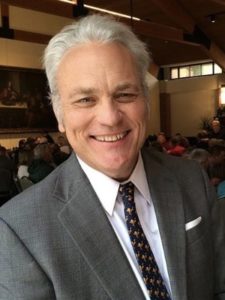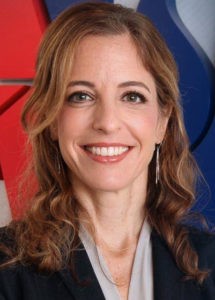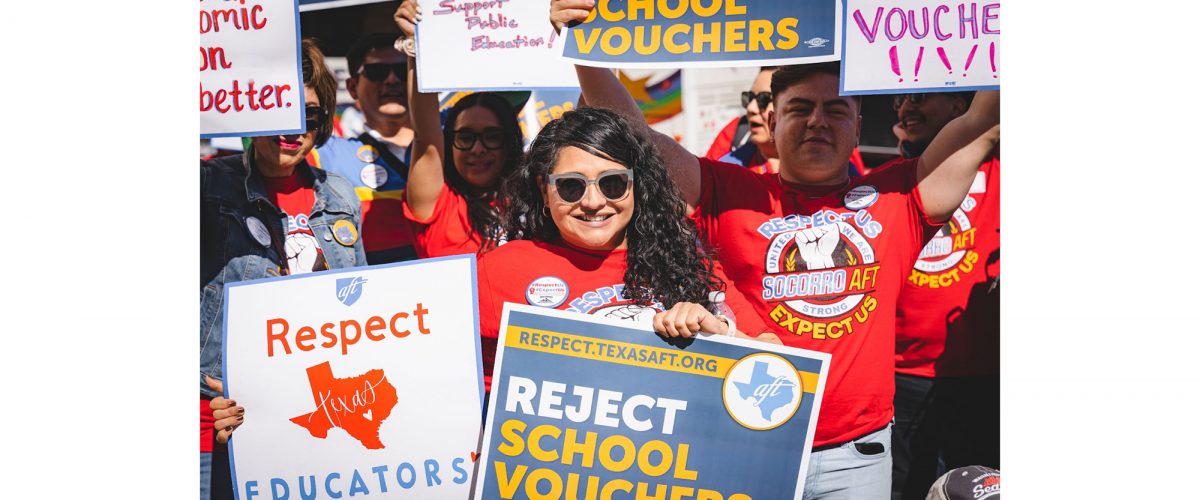The quest to direct public funds to sectarian schools is meeting with mixed results this legislative season, with what would have been the nation’s first religious charter school being denied in Oklahoma, a deeply religious and conservative state.
While Florida lawmakers have expanded school voucher programs there, the Republican-controlled House of Representatives in Texas blocked using taxpayer funds for religious education — a major defeat for the school voucher movement.
Earlier this year, Iowa and Utah became the second and third states to enact universal education savings account programs, following a pattern set by Arizona in 2022.
Last year, Arizona approved the nation’s first education savings account open to all school-age children to pay for private school tuition.
Last year, Arizona approved the nation’s first education savings account open to all school-age children to pay for private school tuition. Parents may apply through the Arizona Department of Education to use an Education Savings Account and receive more than $6,500 per year per child for private school, homeschooling, micro-schools, tutoring or any other form of education provided outside of a traditional public school system. Eligible students cannot be enrolled in public or charter schools.
This is the most expansive school voucher program in the nation.
In January, Utah adopted the Utah Fits All Scholarship Program that will provide eligible students not enrolled full time in a public school with up to $8,000 per year in scholarship funds to be used in private schools.
And in Iowa, the Students First Act created an education savings account for K-12 students who want to attend private schools. This program will award $7,598 per student per year.
More recently:
- North Dakota legislators approved a school voucher bill that will offset 30% of the cost of tuition for some families sending their children to private schools. To qualify, a family’s gross taxable income must be under 500% of the federal poverty level, which means an annual household income of about $150,000.
- Florida Gov. Ron DeSantis recently signed legislation allowing all K-12 students in the state to get $8,500 annually in taxpayer-funded vouchers for private schools, expanding a program begun two decades ago under then-Gov. Jeb Bush. The new law eliminates income eligibility limits.
- Arkansas legislators have created an Educational Freedom Account Program that will be phased in over several years and will offer about $6,600 per student per year for private school expenses.
- In West Virginia, a Hope Scholarship Program has survived court challenges and now provides about $4,300 per year per student for educational expenses outside public schools.
- In North Carolina, a proposed “Choose Your School, Choose Your Future” plan would expand the eligibility for an existing voucher program to all families, regardless of income levels.
- Georgia Gov. Brian Kemp has thrown his support behind a measure to expand funding for private school vouchers. The bill passed by the state Senate and now pending in the House would provide a $6,500 annual voucher for students’ educational choice.
- In Kansas, the House narrowly approved an education savings account plan that would give qualifying families about $5,000 to use toward the cost of private school tuition or homeschooling. The bill is now in the Senate, and Democratic Gov. Laura Kelly, who opposes vouchers, faces a potential dilemma because the same bill also would provide salary increases for public school teachers, which she supports.
Church-state separationists, teachers’ unions and public school administrators have vehemently opposed school voucher schemes for decades. This coalition has been able to block most such proposed legislation at the state and federal levels until recently. Emboldened Republican-controlled state legislatures this year have renewed efforts to funnel public education funds to private schools, including sectarian schools.
Those favoring vouchers argue parents should be able to access public funding for whatever school they believe is the best choice for their children.
One state where opponents of vouchers have continued to prevail is Texas, which ranks only behind California for the largest number of public school students of any state in the nation. “School choice” advocates have lobbied for decades to get a private school voucher program passed in the Lone Star State but have met stiff opposition from conservative lawmakers from rural communities where public schools are important economic and social drivers.

Charles Foster Johnson
The opposition to vouchers in Texas has been led by an interfaith group with Baptist roots: Pastors for Texas Children. That group’s executive director, Charles Foster Johnson, is a Baptist pastor.
This week, the Texas Senate adopted a bill to create education savings accounts — another name for vouchers — but the Texas House simultaneously adopted an amendment banning the use of state funds in school voucher programs.
The 86-52 vote for the amendment against school vouchers brought together all the chamber’s Democrats with 24 Republicans. Some other Republicans registered as “present, not voting.”
Meanwhile, across the Red River in Oklahoma, the Oklahoma Statewide Virtual Charter School Board voted unanimously not to approve an application to create St. Isidore of Seville Catholic Virtual School. This would have been the first publicly funded religious charter school in the country.
St. Isidore of Seville would promote, teach and enforce Catholic doctrine, including the church’s beliefs on sexual orientation, gender identity and morality.
Oklahoma Attorney General Gentner Drummond warned against creating a “slippery slope” toward state-funded religion. He reversed an opinion from his predecessor, John O’Connor, who during a brief appointed stint in office said recent U.S. Supreme Court rulings compelled Oklahoma to allow religious charter schools.
Legal challenges are likely to follow.
In Oklahoma — a heavily Protestant state — about 9,000 students attend Catholic schools, mainly in Oklahoma City and Tulsa. Catholic leaders proposed creating the new virtual school to serve students in areas of the state where no Catholic schools exist.

Rachel Laser
Rachel Laser, president of Americans United for Separation of Church and State, praised the outcome in Oklahoma.
“State and federal laws are clear: Charter schools are public schools that must be secular and open to all students,” she said. “No public school family should fear their child will be required by charter schools to take theology classes or be expelled for failing to conform to religious doctrines. And the government should never force anyone to fund religious education.”
On the federal level, the U.S. House of Representatives recently voted down a proposed amendment that would have diverted federal education funds to “follow” each child, whether for public or private education. The proposal by Rep. Chip Roy, R-Texas, would have created a nationwide school voucher scheme.
Baptist Joint Committee for Religious Liberty was among the opponents of that amendment, which was defeated by a vote of 311-113. More than 100 Republicans joined all House Democrats in voting no.
A statement from BJC said, “While parents absolutely have the right to choose religious education for their children, BJC has long emphasized that taxpayers should not shoulder the financial burden of funding religious teachings.”
The BJC statement added: “Robust religious liberty protections for all rely on a strong public school system, which could be decimated financially in many areas by voucher funding schemes. … A robust public school curriculum may be the most practical way to oppose Christian nationalism.”
BJC warned: “All who believe in religious liberty and support a strong public school system must continue to educate others on the dangers of school vouchers. For now, it’s heartening to see that there is a strong, bipartisan majority in Congress willing to draw the line at a nationwide voucher system using federal tax dollars.”
Related articles:
Pastors gear up to battle bequest of vouchers for children in private schools
Private school vouchers as civil rights? Baloney!
Supreme Court opens new chapter of state funding for religious schools
Oklahoma could have nation’s first publicly funded Catholic charter schools


